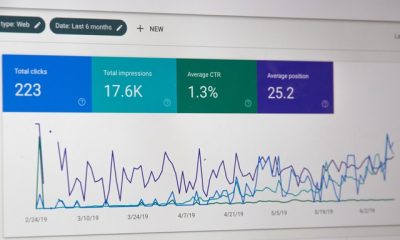Business
9 tips for redesigning, refreshing and decluttering your website
You’ve probably heard of Marie Kondo by now: she sparked a whole movement of decluttering and has a Netflix show called “Tidying Up With Marie Kondo.”

Also known as the KonMari method, her focus is on organizing your home by getting rid of items that do not “spark joy.”
While her method applies more to dresser drawers and workspaces, there’s no reason why you can’t Marie Kondo your website! Just like your home and office, your site needs to be cleaned from time to time.
Here are 9 website redesign and refresh tips to help you get the most out of the experience:
1. Do a content audit.
You can’t see where you’re going if you don’t know where you’ve been, right? A content audit is about taking inventory of all the content on your site so that you can see what’s relevant and what’s not.
If you’ve got blog posts that are years old, it’s time to decide if there’s value in repurposing them with up-to-date content or taking them down. We’re doing this right now as we prepare to revamp our website. Many of our very old articles are either being trashed or repurposed for future, more up-to-date articles.
Be careful not to kill a blog post that’s driving a huge chunk of your traffic, but don’t hold on to every article if the info is no longer relevant or your target audience has changed.
Also, if you have products or services available online, make sure the description and pricing for each are current.
2. Revisit your content strategy.
While you’re doing your content audit, explore your analytics to see what content people are spending time on and what content is performing poorly.
Once you have a clear picture of your best-performing articles, blogs, and videos, you can work on creating fresh and engaging content and/or repurpose the right stuff.
It can be helpful to create a content calendar that breaks down weeks or months by theme.
Let’s use marketing for health coaches as an example. In January, you might want to focus on healthy eating, breaking bad habits and fun workouts to tie in with New Year’s resolutions.
In June, you could focus on water-based workouts, refreshing summer meals and the importance of sunscreen. Brainstorm a list of ideas and go from there!
3. Make sure your pages look good on mobile.
You should be keeping mobile in mind every time you create a new piece of content, and now’s the time to take an even closer look.
Too many business owners put all their energy into a website redesign, neglecting this critical part of the user experience. Or, some business owners feel their audience doesn’t use mobile to access their site.
This is a poor assumption that can have huge ramifications. Many people are browsing your website, reading your eNewsletter and checking out your blog on their smartphones. If in doubt, check your Google Analytics that will tell you how much website traffic comes from mobile phones.
Ensure web pages are easy to follow, buttons are big enough to click on and no content is lost when you’re looking at it on a smartphone.

Business owners must ensure that their website is also mobile-friendly. (Source)
4. Check for broken links.
This is another great way to dust off your website. Broken links not only annoy and potentially drive away visitors (often sending them right to your competition), but they’re also bad for your search engine rankings.
There are various tools that let you scour your site for broken links, so use them.
5. Update your About Us page if needed.
Do you have bios from employees who left six months ago? Has your company received new awards or accolades?
If a potential client lands on your site and sees outdated info, they’re going to think twice about buying from you, so keep your About Us page fresh and polished.
6. Ensure your software and plug-ins are up to date.
This is essential not only to tidiness but to website security.
You may be tempted to ignore those messages telling you to update to the latest version, but they’re essential to prevent security vulnerabilities and keep your site at optimal speed and functionality.
This is especially crucial if you have access to visitors’ information such as credit card numbers and email addresses.
7. Consider a site refresh.
Maybe your business has evolved and you want to rebrand your logo. Or, maybe you’re seeing photos from two years ago on your “What’s New” page!
Let’s use the example of a health and wellness website design. If a health coach originally worked with millennials with limited budgets but now targets pregnant and breastfeeding women for meal and exercise planning, he or she would need to add brand messaging, photos and content that appear to the new target audience.
Small changes can make a big difference, but make sure you’re rebranding for the right reasons if you’re thinking about updating a key part of your brand identity.
8. Check for clear calls to action.
You need to show visitors what to do, or else what they’ll probably do is leave. Now’s the time to fix clunky CTAs that aren’t working (look at your stats for insight) or find pages where they’re missing.
Here are some things to keep in mind when you’re optimizing your CTAs:
-
Use actionable text that draws in your visitor (think “Download the eBook” not “Click here”).
-
Make CTA a main focus. If you have lots of links, images and copy competing for attention, your call to action could get lost.
-
Create urgency with words like “today” and “now.”
-
Experiment with the first person. According to a study by Unbounce, changing button text from the second person (“Start your free trial”) to the first person (“Start my free trial”) resulted in a 90 percent increase in clicks.
9. Speed up your site.
Do some pages on your website take a long time to load?
According to MatchMetrics, 14 percent of your audience will start shopping at another site if your page loads are slow, and 23 percent will simply stop the shopping experience or walk away from the computer.
Take a long look at your hosting provider, image sizes and videos and installed plugins to start to get to the root of what’s causing your lagging responsiveness.
—
DISCLAIMER: This article expresses my own ideas and opinions. Any information I have shared are from sources that I believe to be reliable and accurate. I did not receive any financial compensation for writing this post, nor do I own any shares in any company I’ve mentioned. I encourage any reader to do their own diligent research first before making any investment decisions.

-

 Markets2 weeks ago
Markets2 weeks agoSilver Dips Sharply, While Gold Gains Amid Mixed Stock Market
-

 Africa3 days ago
Africa3 days agoMorocco’s Tax Reforms Show Tangible Results
-

 Africa1 week ago
Africa1 week agoTunisia Holds Interest Rate as Inflation Eases, Debate Grows
-

 Fintech5 days ago
Fintech5 days agoRuvo Raises $4.6M to Power Crypto-Pix Remittances Between Brazil and the U.S.
![Kevin Harrington - 1.5 Minutes to a Lifetime of Wealth [OTC: RSTN]](https://born2invest.com/wp-content/uploads/2023/12/kevin-harrington-400x240.jpg)
![Kevin Harrington - 1.5 Minutes to a Lifetime of Wealth [OTC: RSTN]](https://born2invest.com/wp-content/uploads/2023/12/kevin-harrington-80x80.jpg)





















